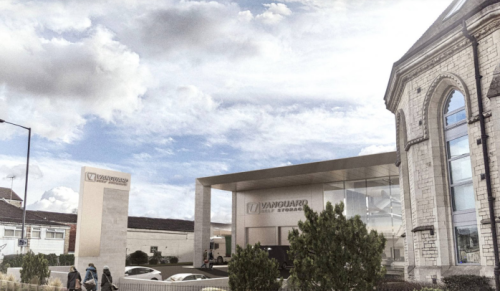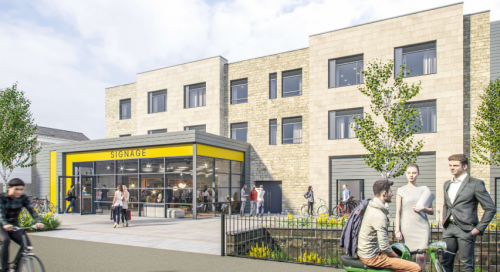In 2021, it was announced that the Regency Laundry would be relocating from its original premises, first established in 1879, on Lower Bristol Road. This followed a number of public consultations through 2020 with the intention to bring this industrial site forward for redevelopment.
2022/2023 – Planning Application for Proposed Development of Self-Storage Facility on Former Laundry Site
 New plans were submitted under application 22/04431/FUL to address this reason for refusal, proposing a four storey self-storage unit. The building would be more industrial in character to reflect its use, clad in bronze-coloured standing seam metal but with a Bath stone ashlar elevation facing onto Lower Bristol Road. Whilst BPT continues to support the redevelopment of this brownfield site in principle, we expressed grave concerns with the height, scale, and massing of development, as well as the depth of the floor plan, and the impact this would have on local townscape character as well as the residential amenity of surrounding, modest two storey terraces. The extensive use of metal wall cladding was not considered to be appropriate in this location.
New plans were submitted under application 22/04431/FUL to address this reason for refusal, proposing a four storey self-storage unit. The building would be more industrial in character to reflect its use, clad in bronze-coloured standing seam metal but with a Bath stone ashlar elevation facing onto Lower Bristol Road. Whilst BPT continues to support the redevelopment of this brownfield site in principle, we expressed grave concerns with the height, scale, and massing of development, as well as the depth of the floor plan, and the impact this would have on local townscape character as well as the residential amenity of surrounding, modest two storey terraces. The extensive use of metal wall cladding was not considered to be appropriate in this location.
Read our objection response here.
The application was referred to Planning Committee in June 2023, with an officer recommendation to delegate to permit the application. BPT spoke against proposals on grounds of excessive height, scale, and massing which would be out of keeping with local townscape character. A motion to delegate to permit the application was passed on grounds that the Committee felt there weren’t enough substantial reasons for refusal.
Read BPT’s spoken representation against the application here.
2020/2021 – Pre-App Consultation & Planning Application for Proposed Development of Co-Living Block on Former Laundry Site

Initial proposals in February 2020 were for the development of new blocks of Purpose-Built Student Accommodation (PBSA) on the site. The consultation documents are available here. In response to the consultation, members of the public and local residents expressed a strong preference for residential accommodation as opposed to further student development within the city. As a result, the Watkin Jones Group brought forward a ‘co-living’ scheme targeting young professionals and graduates; the co-living model has been established in high-density urban areas such as London, offering self-contained studio-style apartments alongside shared communal facilities and workspaces within the same building.
Application 20/03166/FUL proposed a co-living facility of 155 en-suite studios in two 3-4 storey blocks running back from the Lower Bristol Road frontage. BPT expressed strong concerns in response to the height, scale, and massing of the scheme, which within the context of the site we considered to be overdevelopment. The development was submitted during the aftermath of Covid-19 and multiple lockdowns, and we questioned how well the co-living model would work with the predicted long-term impact of the pandemic and changes in housing use and demand. We raised concerns that the development would fail to meet national space standards, and the mono-provision of single bed studios would fail to provide varied housing mix to meet local demand.
Read our response to the 2020 planning application here.
In August 2021, the application was referred to the Planning Committee, and recommended for refusal by the case officer. BPT spoke against the scheme at Planning Committee on grounds that “the proposed height, scale, and massing would fail to sustain or reinforce local distinctiveness, detract from townscape amenity value, harm the character and appearance the indicative setting of the conservation area, and cause harm the setting of multiple Grade II buildings.” The main points discussed by councillors was the loss of an industrial unit without having been marketed for 12 months. The applicant clarified that measures would be put in place to ensure tenancies would be targeted at young professionals rather than students. It was voted to defer a decision in favour of a site visit.
The scheme was determined by Planning Committee in September 2021, with Councillors voting to refuse the planning application because the premises had not been adequately marketed to determine whether there was a need for industrial premises before redevelopment was considered.

